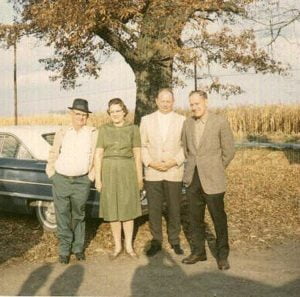
My Hillbilly Roots
J.D. Vance’s rural Kentucky roots, described in his book, “Hillbilly Elegy,” differ from my father’s family in southern Indiana in one important way. Vance’s violent, angry mother was a substance abuser with a trail of failed relationships in her wake. Vance carries the childhood scars. My dad’s family was a bunch of kind, reticent, teetotaling farmers.

But the similarities between our families struck me too – Vance called his grandfather Blanton “Papaw,” which I’d always thought was unique to my own Papaw Blanton but, I now know, is an endearment. And believe me, the corn fields and hills of southern Indiana and contiguous Kentucky are more southern than Midwestern. My grandma’s fried chicken was heaven.
The backdrop for Vance’s hillbilly stories emerges front and center in my own take on family: I look at rural poverty through a socioeconomic lens.
Vance, an acclaimed writer and Silicon Valley investment banker, “got out” via the Marine Corps, Ohio State University and Yale Law School. “To move up,” he writes, “was to move on.” With sheer determination – supported by his tough, caring Mamaw – he overcame long odds, childhood stress-eating, and psychological retreat from a conflict-filled home. His Yale scholarship wasn’t earned on grades but because “I was one of the poorest kids in the school.”
To be clear, I do not see “getting out” as pejorative. Nor does “getting out” mean getting away from family. Rural people relocate in search of better job opportunities than what is available in depressed areas with eerily quiet “downtowns” of struggling or abandoned establishments pushed out of town by big-box retailers like WalMart and fast-food joints. Getting out is code for earning a decent living, buying a modest house, having health insurance, and being able to retire. In short, capturing the American Dream.
In my family, the strategy of getting out worked for some but not for others. Please bear with me through my generational story.
My late father, Leland Blanton, left home – Jasonville, Indiana, population 2,147 – so that my two brothers and I didn’t have to. His father – Papaw – owned a small-town gas station and, due to childhood polio, walked with a cane. A midwife helped my father’s true-grit mother deliver him into a three-room farmhouse with an outhouse. Twenty years later, his ticket out was a high test score that paved the way to becoming a hotshot pilot in the U.S. Air Force in the 1950s and 1960s. Greenland, Saudi Arabia, Morocco, Greece, Germany, Bangkok, Saigon, Turkey – he flew to every corner of the globe. We all lived nearly three years outside Tokyo.
Our exotic military life was unimaginable to dad’s relatives back home. They would sit, rapt, in my grandparents’ front yard, eating homemade ice cream and listening to his tales of far-away lands when we visited in the summer. My worldly father proudly called himself a “hillbilly.”
In stark contrast, his brother – my late uncle – never moved away. Thanks to the United Mine Workers, he eked out a comfortable-enough living and married an Indiana gal. A welder in a coal mine, my uncle bought a tidy house “in town.” He left a modest pension and health benefits to his widow. His daughter (my cousin) moved up several socioeconomic notches by attending college and marrying a college-educated Navy man. Their daughters went to college and got out and are living the good life as professional Millennials in Portland and Denver. Home “felt like a trap to me,” one of them told me. (I’m not using the family’s names to protect their privacy.)
But my uncle’s son never left home or went to college – the tickets “out.” I see my cousin’s reflection clearly in “Hillbilly Elegy.” His family tries to help him, but he is poor and has had a hard life. His father’s profession in the mines dissipated, so he is a butcher at a small grocery store. Predictably, there is neither a union nor health benefits to pay for his chronic medical condition. He owes $50,000 in medical debt.
The economic decline continued with his sons, now in their 20s. One works at a gas station and another has been unemployed since a family tragedy. They are smart but, for some reason, didn’t pursue the modest opportunities offered them – though they are still young! Talking at a family reunion to one of them with a keen interest in computers, I encouraged him to take one computer class at a local college. But it felt to me that this small step was – again – unimaginable to him.
Are they lazy? Absolutely not. The white working poor work very hard. One study found that they clock more hours on the job than college-educated people. Vance, the author, believes that those who make it in this country are either lucky – their parents did well – or so smart they “couldn’t fail if they tried.” I tend to agree.
My cousin’s Portland daughter says it better than I could: “If we are to move forward in this country, we have to work harder at understanding one another.” This blog attempts a small contribution to that.
Squared Away writer Kim Blanton invites you to follow us on Twitter @SquaredAwayBC. To stay current on our blog, please join our free email list. You’ll receive just one email each week – with links to the two new posts for that week – when you sign up here.
Comments are closed.







Thanks for sharing from whence you came. We are all a living patchwork of our life experiences. Compassion literally means “to suffer together.” Your cousin’s daughter has it right. Instead of maligning – as some do – the views in Vance’s book, why not seek to understand and share their suffering on the road to creating policy? As you’ve done here.
Great post.
The parts of rural America I have known throughout my life have mostly become sad “hollowed out” places. There is an urban/rural divide, and too often the urbane view circumstances through a prism of snobbery, rather then sympathy.
I heard this interesting interview last night on NPR.
https://www.npr.org/2018/01/31/582240482/historian-makes-case-for-what-you-are-getting-wrong-about-appalachia-in-new-book
Great story, and timely as well. Thank you for sharing.
Your story was so interesting. I think no matter where we come from, some have a burning desire and drive to be more, learn more, and have more. Others seem content with their circumstances and are satisfied with a simple life in familiar surroundings.
It has been my experience that some people are not motivated to attain wealth or prominence. They simply lack the desire, while others are unstoppable in spite of many handicaps. Human nature is capricious and mysterious.
Where there’s a will, there’s a way.
Yes, Kim, thanks for sharing. Reflecting on your story, what comes to my mind is the incredible extent to which our early “conditioning” shapes the way we see ourselves and the world. Compassion — whether for self or others — is one of the few tools potent enough to break open and expand that view.
A lot of truth in being at the right place at the right time, or having connections. We are a product of our environment, very seldom does that change. For the fortunate few, it can and does.
I predict that there will be more comments on this blog post than any other this year. Thank you for sharing your hillbilly roots with us.
Maybe not hillbillies (but close) were my mom’s family in a Pennsylvania coal mining town. Mom left in 1929 for Brooklyn, NY and never looked back. She was always encouraging her brothers and sisters to leave for a better life in the city. I have several cousins and their children who still live in the country. The rest have the good life because my aunts and uncle moved to the big city and made a better life for their kids.
The point that struck me in the article was the difference between your uncle and your cousin and connecting it to the disappearance of union jobs.
My father was a union guy, a Teamster, and because of it could send his 3 children to college. And when I had a choice of entering a helping profession I chose teaching in a unionized public school. Your cousin ended up in a non-union job without employer health insurance.
The rich and powerful in this country push a narrative that union’s are an anachronism. I’ll take one anachronism and health insurance any day. Nice article.
Thank you for writing this in your blog!
First, a belated congratulations on the blog’s recognition by the Wall Street Journal! Also, great piece on your “hillbilly roots.” While I am a born-and-bred Bostonian, I’ve spent some time and have relations in Appalachian coal country, so I’ve gained at least a little bit of perspective on the region (broadly defined). It actually bothers me now when a fellow Northeastern urbanite dismisses people they haven’t met as “hicks.” (Granted, some Southerners have dismissive terms for us.)
Nice article. I read the JD Vance book last year. Sometimes my software job takes me into the factories in rural parts of the country and I see the challenge people face today. I was in small town Indiana, also Jasper, during high school and college. Well under 30% of my high school class went to college. But right after graduation I moved out, to metro Boston. Society, and not just government, should do more to encourage career mobility, subsidize U Hauls even, and re-train for example. Convert dying shopping malls into other purposes like trade schools and distribution centers. But you know sometimes those small towns attract career-type jobs nearby – my Toyota came from a modern assembly plant in a town barely 20 miles from Jasper. You can make a nice life in some of those small towns, friendly people, scenic, quiet, affordable. Wife and I are near retirement now and would like to relocate to a small town near my kids (who bolted also) and near a good medical center.
Dick – subsidizing U-Hauls is a great idea! Maybe 1 week in a motel? And I agree there’s much to be said for rural life.
Thank you every one for your feed back,
Kim the blogger
Compelling article Kim, thank you. I’ve been meaning to pick up Vance’s book for a while now.
I see myself in those words, living a life very different from the one scripted for me at birth.
I’ve been able to achieve financial independence in spite of the overwhelming odds and yet live in a kind of limbo….a working-class family of origin all still living in a rural area and here I am in a major metro area with an advanced degree, a fish out of water.
Along these lines, I often recommend another great book on the topic and will mention it here: “Limbo: Blue Collar Roots, White Collar Dreams” by Alfred Lubrano.
Thank you.
Thank you for the book recommendation Lynn-and thanks everyone else for their interest and insights!
Kim (the blogger)